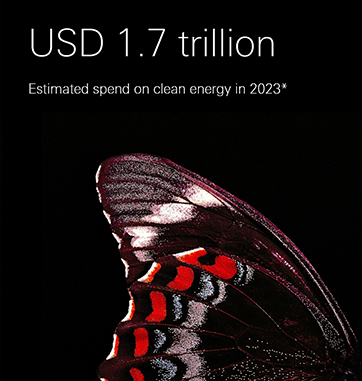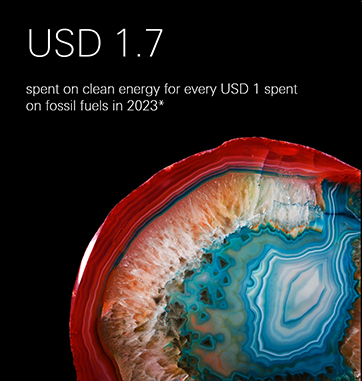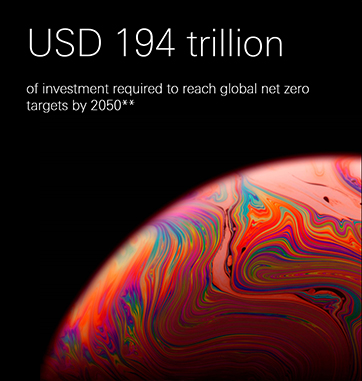Opening up opportunities in the global energy transition
With HSBC Asset Management, access resilient and growing private companies that have the potential to generate long-term sustainable outcomes for investors, societies, and the planet.
Global Transition Investment - overall market numbers
 |
 |
 |
Sources: *IEA, 2023. **BloombergNEF Research, 2023.
Supporting the transition towards clean energy
Investing in energy transition infrastructure is important to combating climate change, creating jobs, and securing energy independence.
Right now, transition infrastructure may be at the beginning of a long-term investment cycle, providing you the opportunity to invest in the transition. Infrastructure can offer investors access to potentially stable and resilient cash flows and a natural hedge against inflation.
Invest in the transition
To help you capture and maximise the potential upside of the transition to a lower carbon world, we provide a range of innovative investment solutions spanning regions, sectors, and markets.
Explore our strategies
Our infrastructure equity strategies aim to generate long-term total returns from listed and unlisted infrastructure, with a focus on utilities, energy infrastructure, transportation, and communications. |
Our infrastructure debt strategies aim to provide yielding-based returns and an illiquidity premium while seeking to reduce credit risk. |
Our climate technology strategy focuses on early stage companies working on the transition to a net zero economy across power transformation, transport electrification, and supply chain sustainability. |
Our natural capital strategies focus on large scale, nature friendly investments across sustainable forestry, water, land management, carbon-based projects, and biodiversity. |
Let us open up a world of transition investment opportunities for you.
Key Risks
Risk Considerations. There is no assurance that a portfolio will achieve its investment objective or will work under all market conditions. The value of investments may go down as well as up and you may not get back the amount originally invested. Portfolios may be subject to certain additional risks, which should be considered carefully along with their investment objectives and fees.
- Illiquidity: An investment in alternatives is a long term illiquid investment. By their nature, the alternatives’ investments will not generally be exchange traded. These investments will be illiquid
- Long term horizon: Investors should expect to be locked-in for the full term of the investment
- Economic conditions: The economic cycle and prevailing interest rates will impact the attractiveness of the underlying investments. Economic activity and sentiment also impacts the performance of underlying companies, and will have a direct bearing on the ability of companies to keep up with interest and principal repayments
- Valuation: These investments may have no or a limited liquid market, and other investments including those in respect of loans and securities of private companies, may be based on estimates which cannot be marked to market until sale. The valuation of the underlying investments is therefore inherently opaque
- Strategy Risk: Investments into alternatives may, among other risks, be negatively affected by adverse regulatory developments or reform, credit risk and counterparty risk. The credit market bears idiosyncratic risks such as borrower fraud, borrower bankruptcy, prepayment risk, security enforceability risk, subordination risk and lender liability risk
- Investor’s Capital At Risk: Investors may lose the entirety of invested capital


